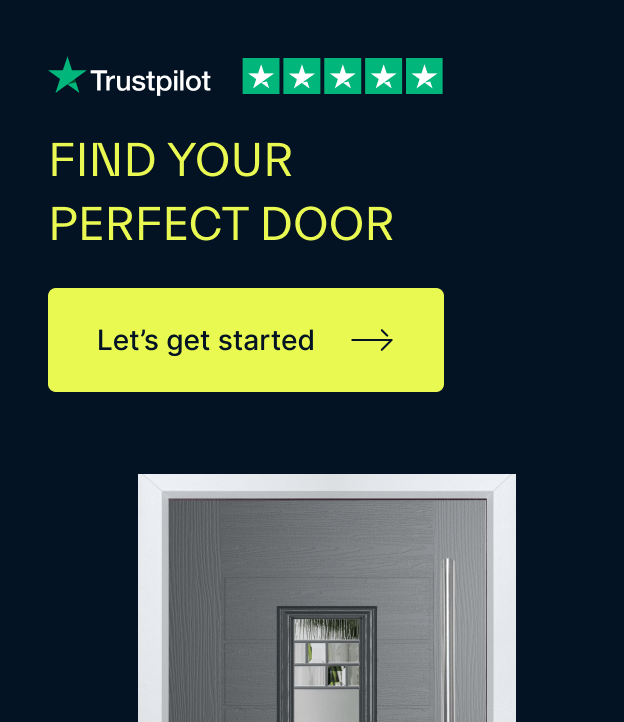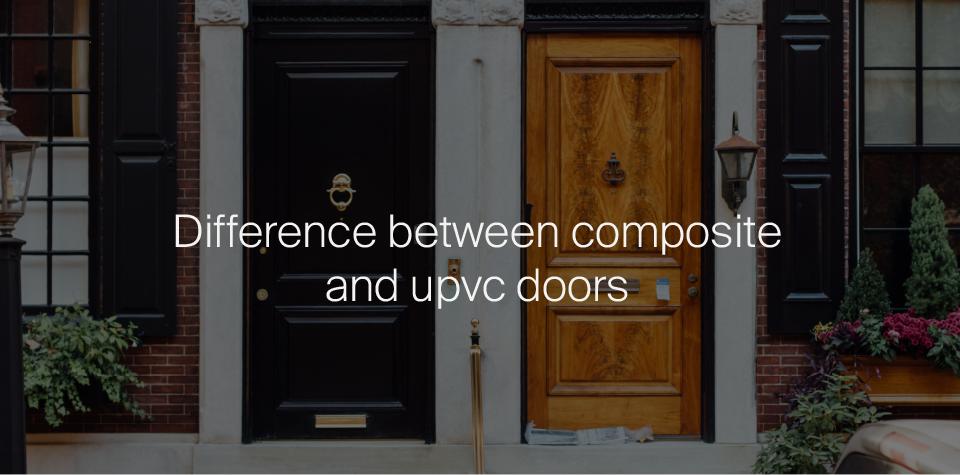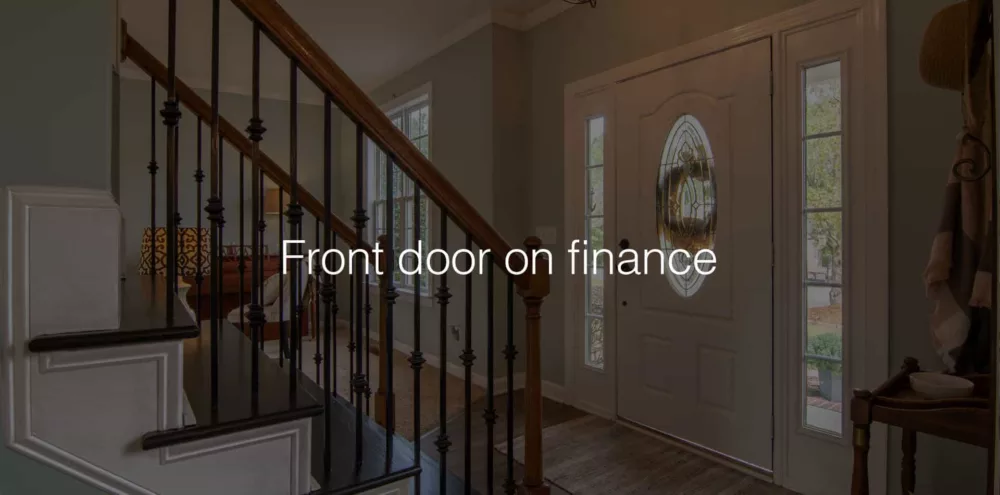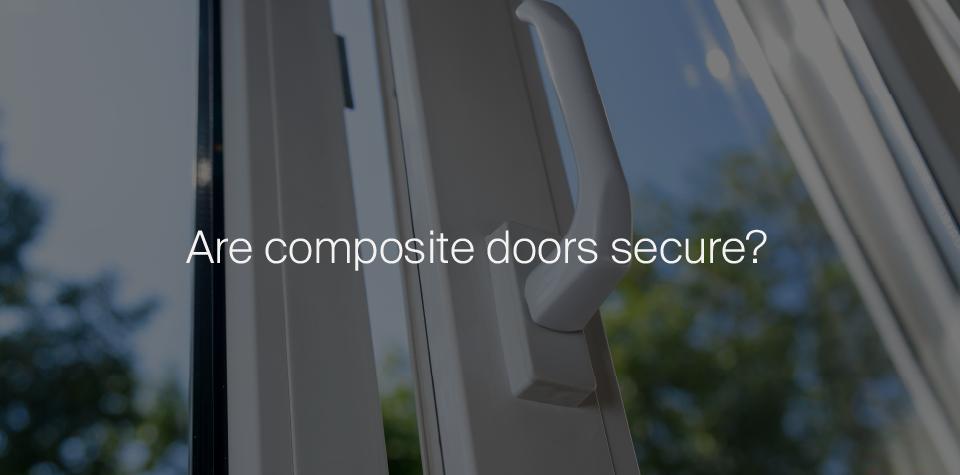uPVC vs Composite Doors - What Are The Differences?
There are many types of doors on the market today, and it can be hard to know which one is right for your home.
If you're considering composite or uPVC doors, there are a few key differences you should be aware of before you decide whether composite doors are better than uPVC.
What is the difference between uPVC and composite doors? Composite doors are made from a mix of materials, making them more expensive than other materials, and uPVC doors are made entirely from plastic.
Let's look at the other differences and benefits in more detail so you can easily choose your new front door or back door for your property and find out if there is a clear winner in the composite vs uPVC door debate.
What Is A Composite Door?
Composite doors are made from different materials, including wood, metal, and glass. They are typically more expensive than other types of doors, but they offer many benefits. They have a solid timber core, a uPVC door frame, and GRP (glass-reinforced plastic).
They are very durable and can withstand extreme weather conditions. They are also very energy-efficient, which can help lower your energy bills.
But are composite doors warmer than uPVC doors? The answer is a resounding yes, as they are thicker.
What Is a uPVC Door?
uPVC doors are made from a plastic called polyvinyl chloride. They are strong, durable, and require very little maintenance.
uPVC doors are available in various colours and designs to suit your home and add aesthetic appeal. A uPVC front door is made by covering an insulated steel frame in uPVC.
The Benefits Of A Composite Door
Composite doors have many benefits over traditional uPVC doors. Here are just a few:
- They are more thermally efficient than uPVC doors, meaning they will help keep your home warmer in winter and cooler in summer.
- Their multi-point locking systems and reinforced construction make them much more secure than uPVC doors.
- They're available in various door styles and glass designs, so you can find the perfect door to complement your home's existing aesthetic. A wide range of door furniture.
- They require low maintenance and are built to last over 25 years and up to 35 years, making them a great long-term investment for your home. The occasional wipe-down with a damp cloth is sufficient.
- Weather resistant.
- The manufacturing process is more complex.
- They are made from more expensive materials than uPVC doors.
- There's insulating foam inside the door.
- Better energy savings can make them the cheaper option in the long run.
- Glass-reinforced plastic is used in the construction.
Design and order a composite door online below:
The Benefits Of A uPVC Door
There are several benefits to choosing a uPVC door:
- uPVC front doors provide thermal efficiency against the cold and help to keep your home warmer in winter. (Composite doors provide the same functionality but on a higher level.)
- A uPVC door requires very little maintenance. It doesn't need to be repainted or refinished and is resistant to warping, rotting, and insect damage. You may need to lubricate the hinges and locks occasionally, but this is typically only necessary if they start to squeak or stick.
- uPVC doors are available in various styles and colours to suit any taste. They can also be fitted with glass panels that let in natural light and add a touch of elegance to your home's entryway.
- They are significantly lower priced than composite doors.
Design and order a uPVC door below:
Which Front Door Should You Choose For Your Home?
There is no easy answer when choosing between these new front door options.
Both composite and uPVC door materials have unique benefits that make them ideal for different homes and needs.
Here are a few things to consider when making your decision between uPVC and composite doors:
Cost: A composite front door tends to be more expensive than a uPVC door, but it offers better insulation and enhanced security features. If cost is a major consideration, then uPVC doors may be the better option.
Maintenance: Composite doors require less maintenance than uPVC doors, making them a good choice for busy families or those who don't want to spend a lot of time on door upkeep.
Insulation: Composite doors offer better insulation than uPVC doors, which can help keep your home warm in winter and cool in summer. This can lead to lower energy bills and a more comfortable home overall.
Security: A composite door is typically more secure than a uPVC door and frame or any other wooden doors, thanks to its more robust construction and solid door material. This makes them a good choice for homes in high-crime areas or for families who want extra peace of mind.
Style: Both composite doors and uPVC doors come in various styles and colours to suit any home, but composite doors do offer more design options. Whether you're looking for a traditional wood-effect door or something more modern, you will likely find a composite door that meets your needs.
Which is the most energy-efficient, a composite or uPVC door?
There are a few factors to consider when deciding whether a composite or uPVC door is more energy-efficient.
The most crucial factor is the type of insulation that the door has. Composite doors typically have better insulation than uPVC doors, which will keep your home warmer in the winter and cooler in the summer.
Another factor to consider is the overall thickness of the door. A thicker door will provide more insulation than a thinner door. Composite doors are typically thicker than uPVC doors, offering better insulation.
Finally, you should consider the type of glass that the door has. Double-glazed glass is more energy-efficient than single-glazed glass. Composite doors typically have double-glazed glass, while uPVC doors usually have single.
Overall, composite doors are more energy-efficient than uPVC doors. They offer better insulation and are typically thicker, and have double-glazed glass.
You will also find that a new door will have a higher level of energy efficiency than older doors, as they are likely to be less worn down and warped over long periods.
Which is most popular, uPVC or Composite front doors?
Composite doors are quickly becoming the more popular choice for homeowners. While they do cost more than uPVC doors, they offer several advantages that make them worth the investment.
For instance, composite doors are more durable and safer than uPVC doors and are also available in various styles and colours to match any home’s décor.
If you’re looking for an affordable entrance door that requires little maintenance, then uPVC is still a good option.
However, composite is the way to go if you want a door that lasts longer and adds style to a modern home or period property.
How to look after a uPVC front doors
Here are a few tips to keep your uPVC door looking its best:
- Wipe the door regularly with a soft, damp cloth to remove dirt and grime.
- If you notice any scratches or other damage, use a uPVC door repair kit to touch up the area.
- Inspect the door regularly to ensure all the hardware is tight and secure.
- If you live in an area with high winds or storms, check the door periodically to ensure it is firmly attached to the frame.
How to look after a Composite door front doors
Here are some tips for caring for your composite door:
- Inspect your door regularly for any signs of damage, such as composite door warping, cracks or loose hardware, ensuring your door still fits the door frame.
- If you notice any damage, repair it immediately to prevent further deterioration.
- Wipe the door down with a mild soap and water solution to keep it clean. You can also use a pressure washer to clean the door, but be careful not to damage the finish.
- To protect the door from the elements, apply a fresh coat of paint or sealant once a year.
By following these simple tips, you can keep your composite door looking great for years.
FAQs
Are composite doors better than uPVC?
uPVC doors are a popular choice for many homeowners as they are relatively inexpensive and require little maintenance. However, composite doors are better and more robust.
Composite doors are more expensive than uPVC doors but offer better insulation and are more durable.
Are composite doors more secure than a uPVC door and frame?
Composite doors are made from wood, uPVC, and steel. This makes them more resistant to forced entry than uPVC doors made from a single material. Composite door types also have a thicker core, making them more challenging to break through.
Is a composite door worth it?
Composite doors can cost more than traditional wooden doors and uPVC doors, but they're worth the investment for their durability and low-maintenance features. A composite door is an excellent option if you're looking to upgrade your home's security and improve its curb appeal with a new front door.
This is why when it is uPVC vs composite doors, many people will opt for composite doors due to both the short-term and long-term advantages they have over them.
What is the price difference between uPVC and composite doors?
A big part of choosing your new front door is how much each door will cost. Composite doors tends to have a higher initial cost compared to uPVC doors, which is one of the many pros and cons of composite doors.
The price difference between uPVC and composite doors tends to be between £300 and £600, with composite door average price at around £1,600, whereas the average cost of uPVC is about £800 with installation.
What are uPVC doors made of?
uPVC doors are made of unplasticised polyvinyl chloride, a material that is commonly used for doors, windows and other building structures. It is known to be cheap, thermally efficient and very low maintenance.
Difference Between Composite and uPVC Doors - Final Thoughts
A composite vs uPVC door is a familiar matchup for modern homes, as making the right decision for your property is significant.
Before deciding on your home, you should be aware of a few key differences between composite and uPVC doors. A composite front door is generally more expensive than a uPVC front door, but it offers better insulation and security, which tends to be the key difference between composite and uPVC doors.
uPVC doors are easier to install and require less maintenance but are less durable than composite doors.
Ultimately, the best door for your home depends on your budget and needs, but remember that the durability of composite styles can make them a better long-term investment, even with the extra cost in the short term.
Look through our range to find some of the best quality UK-made composite door options and get a new door for your home.



